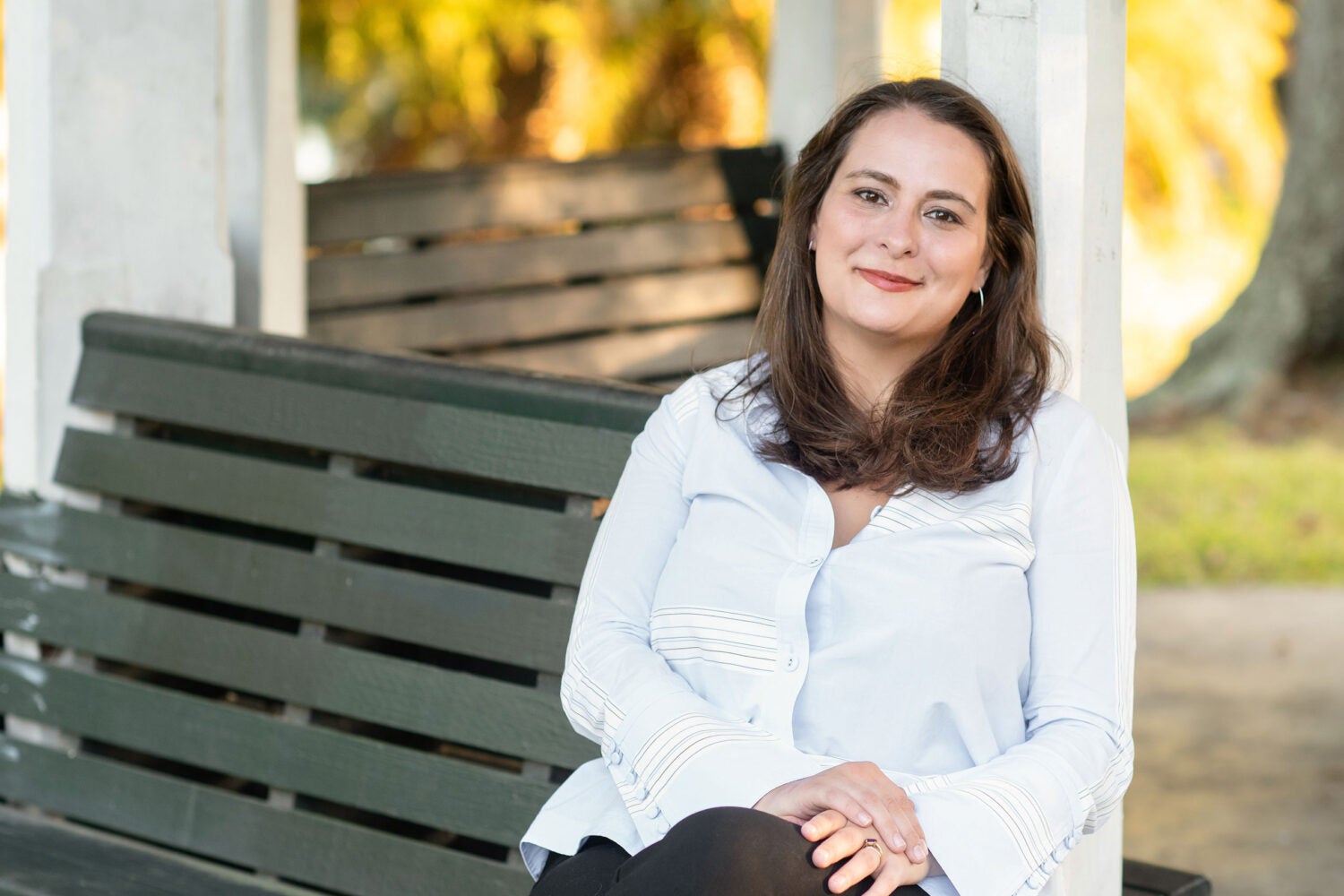For Mercedes Montagnes ’09, working for justice often means hitting the road. The co-founder of the Promise of Justice Initiative, Montagnes, has thrown herself into all aspects of criminal justice reform. Being based in Louisiana, the state with the highest incarceration rate in the United States, has meant driving hundreds of miles from the nonprofit’s offices in New Orleans to rural sites like the Louisiana State Penitentiary, otherwise known as Angola, several times a week.
Montagnes had been serving as the deputy director of the Capital Appeals Project in 2012 when she helped launch the new organization, seeking to “make positive change in the criminal legal system,” with seed money from the Harvard Law School Public Service Venture Fund.
As it celebrates its tenth year, the Promise of Justice Initiative works to create positive change for people in the criminal legal system at the intersection of impact litigation, direct services, and community engagement. In addition to engaging in both civil and criminal litigation, the organization also brings together survivors of violence and the communities where violence happens to focus on healing harm. It also provides on-the-ground direct service to incarcerated clients and their families, explained Montagnes. “Things as simple as putting money on someone’s books so they can afford to buy shoes or a jacket in winter,” she said.
As the executive director and leader of the nonprofit’s litigation team, one of Montagnes’s first cases involved challenging the conditions on Death Row at the state penitentiary where heat in summer could rise to unsafe levels – a campaign made possible by that initial PSVF grant. In addition to covering her salary and visits by experts who could testify about such issues as inmate health and prison conditions in some of the nonprofit’s first lawsuits, the seed money “paid for my gas back and forth to the prison, two and a half to three hours each way,” recalled Montagnes. “I was up there once or twice a week for a very, very long time.”
She’ll be making that long drive again regularly soon, as the Promise of Justice Initiative launches a campaign to tackle inequity and unfair conditions in prison labor, notably at the Louisiana State Penitentiary. “Angola operates much like a former slave plantation,” Montagnes said. “People are picking vegetables and cotton. There are overseers on horseback with guns.”
This, she said, is antithetical to the idea of what any prison labor should entail. “People say, ‘they’re learning skills,’ but that’s not what’s happening here. What’s happening here is people are using agricultural strategies that have been obsolete for a hundred years.”
“Labor should be safe, it should be voluntary, it should be compensated, and it should be aimed toward aiding the incarcerated to participate in the workforce in a way that’s meaningful for them and their families,” she said.
That family involvement is key, stressed Montagnes, who has two young children. She was still a Barnard undergraduate when she first confronted the negative impact of incarceration on both families and the larger community while attending talks organized by the Barnard Center for Research on Women that tackled the subject of domestic violence. In the face of the all-too-common police refusal to get involved, Montagnes said, she had advocated for what she now calls “rigid rules.”
“I just started to understand that this behemoth of a system which had been built up over hundreds of years was really designed to perpetrate racism and inequity.”
Mercedes Montagnes
“Police officers have to arrest the perpetrator at the scene, and he has to be tried,” she recalled believing. That is, until she heard a talk by a district attorney who detailed the effect incarceration had on families, including on the victims of violence and their extended families. “When we think about survivor or perpetrator, it turns out most of those are the same people,” she realized. “Almost everyone who’s incarcerated right now is a victim of and a survivor of violent crime.”
“I just started to understand that this behemoth of a system which had been built up over hundreds of years was really designed to perpetrate racism and inequity,” she said.
This awareness informed her time at Harvard Law, where she worked as a student attorney for the Massachusetts Prisoners’ Legal Services and the Criminal Justice Institute. Following clerkships with Judge Carl J. Barbier of the U.S. District Court Eastern District of Louisiana in New Orleans and Judge Roger L. Gregory of the U.S. Court of Appeals Fourth Circuit in Richmond, Virginia, a Kaufman fellowship — the predecessor of the Public Service Venture Fund — brought her to New Orleans’ Capital Appeals Project.

“Mercedes is an absolutely disarming woman warrior,” said Judith Murciano, associate director and director of fellowships at the Bernard Koteen Office of Public Interest Advising, who served as one of Montagnes’s fellowship advisers. “As a Public Service Venture Fund Fellow, she surveyed the landscape of injustices in the Louisiana carceral system — from inhumane health conditions to forced labor — and deployed a host of effective litigation and policy strategies in novel ways. Since her graduation, Mercedes has generously mentored with characteristic wit and wisdom a significant corps of students inspired to follow her lead in dedicating their education, training, and stamina to realizing creative solutions to formidable problems.”
“Mercedes is an absolutely disarming woman warrior … she surveyed the landscape of injustices in the Louisiana carceral system — from inhumane health conditions to forced labor — and deployed a host of effective litigation and policy strategies in novel ways.”
Judith Murciano, associate director and director of fellowships at the Bernard Koteen Office of Public Interest Advising
This fall brought Montagnes back to Harvard Law School as a Wasserstein Fellow, as she returned to campus for three days to advise students individually and speak to groups on such topics as criminal justice reform, impact litigation, and working in the South. Reporting on the “very high volume of interest among students in criminal justice reform, Mercedes was able to share valuable wisdom from her work leading the Promise of Justice Initiative,” said Jillian Tuck, assistant director for J.D. and LL.M. advising at the Office of Public Interest Advising, who manages the Wasserstein program.
One of the things that I talked to them about was the importance of trying to work locally and really build yourself into a community,” said Montagnes. “Being able to work on the ground in a community, get to know the political scene, understand the players, and have an impact on that community — it is just the best work you can do.”
She also advised students to expand their career aspirations beyond large national organizations and big cities. Urging students to “think expansively about the things they need to make them happy and to make work sustainable,” she said, “I encouraged the students to ask: How can I make an impact? And to look at smaller communities.”
It was advice — and time — she was happy to share. “The law school trusting my vision and believing in me to carry this project to fruition was an immense leg up,” said Montagnes. The PSVF seed money, she said “really allowed us to create what we have today.”
Want to stay up to date with Harvard Law Today? Sign up for our weekly newsletter.
